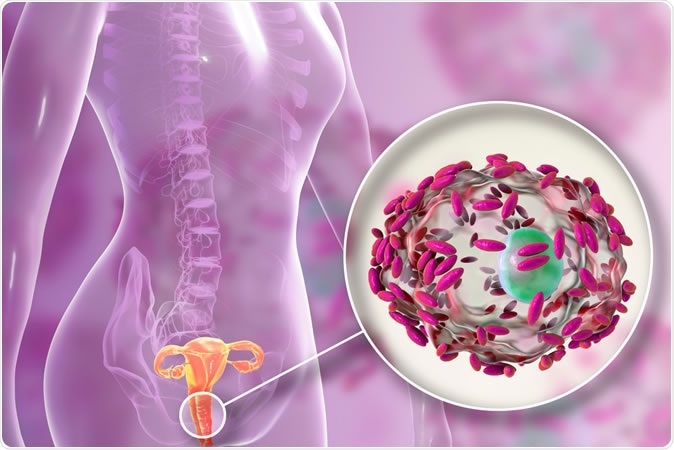Bacterial vaginosis is a common and irksome problem for many women. Now researchers have found the transplanting vaginal fluids of a healthy woman to women with troublesome bacterial vaginosis could restore the bacterial microbiome in the latter’s vaginas and thus help treat them.
The vagina has a rich microbial flora that helps maintain its health say researchers. Bacterial vaginosis is a common bacterial condition that affects one in three women of the reproductive age and usually occurs when the balance between healthy and harmful bacteria is tipped towards the latter and there is a sharp fall in the number of healthy lactobacilli and other friendly bacteria.

Bacterial vaginosis. Vaginal secretions contain epithelial cells, so-called clue cells covered with bacteria Gardnerella vaginalis, 3D illustration - Illustration Credit: Kateryna Kon / Shutterstock
Bacterial vaginosis as such may not be life threatening but may make a woman more vulnerable to acquiring sexually transmitted infections (STIs).
Bacterial vaginosis could also lead to complications such as infertility and may cause complications in pregnant woman, explain the researchers. It is commonly associated with a discharge that smells foul and fishy and may be cause for embarrassment to the women suffering from chronic bacterial vaginosis.
In most cases, antibiotics are used for treatment of this condition but the rate of recurrence is high and within a few weeks or months the condition may come back. For many women long term antibiotics may be needed to curb the condition.
In this new study the researchers tried the experimental procedure of transplanting vaginal fluids from women with healthy vaginal microbiome into women with chronic recurring bacterial vaginosis. They term the procedure as “vaginal microbiome transplantation (VMT)”.
According to co-author Prof Eran Elinav from the Weizmann Institute of Science in Israel, this procedure could help millions of women who suffer from this condition. He said, “By introducing this new treatment approach, we hope that we may come a step closer to providing an affordable solution for the very many millions of women across the world that suffer with this disorder.”
The team of researchers recruited five women between ages 27 and 47 years who were suffering from chronic recurring bacterial vaginosis. These women were all on continuous antibiotics.
Before partaking in the study, the women were asked to stop the antibiotics they were on. A week before the actual transplant, the women were provided with a vaginal antibiotic cream to be applied regularly within their vaginas. This step was to clear out the existing bacterial growth within their vaginas.
Both friendly bacteria as well as harmful bacteria from their vaginas were thus at least partially eliminated. Thereafter the antibiotic creams were stopped. Now healthy vaginal fluids from three healthy women donors were collected and transferred into the vaginas of the five recipient participants.
The donor women were asked to abstain from sexual intercourse for at least a week before the donation to prevent the transmission of sperm to the recipient women. The recipient women were also put on contraception wrote the researchers.
Over the course of the study the women were screened for infections. A series of appointments were set up for the five recipient women where their vaginal cultures and bacterial growths were tested. It was checked if their bacterial vaginosis returned after the transplant. If any evidence of return of bacterial vaginosis was noted, the women received a second round of transplant of healthy vaginal fluid from the donors.
Results showed that four of the five participants showed a long term clearance of their vaginas of the bacterial vaginosis. Three of the five women needed a second transplant of the vaginal fluid with healthy microbiome while two needed only a single transplant. The women were followed up for five to 21 months each and the team wrote that among the four women who showed improvement there was no sign of recurrence of bacterial vaginosis.
The team explained that the donor vaginal fluids were rich in lactobacilli and similar growths were seen among the recipient women as well. There were no side effects of the procedure, added the researchers. In the one women who did not show similar improvement in symptoms as others, it was noted that two transplants resulted in partial improvement of the condition.
Elinav said, “With this friendly microbiome takeover, symptoms and complications associated with BV rapidly subside.” The researchers are on the path to larger clinical trials to prove that their study design is robust and their procedure actually works. They plan to compare their results with placebo and intend to study the long term effects of the vaginal fluid transplants including risks or complications if any. Th authors wrote in conclusion.”
The therapeutic efficacy of VMT in women with intractable and recurrent bacterial vaginosis should be further determined in randomized, placebo-controlled clinical trials.” Elinav said that this modality of treating bacterial vaginosis with vaginal fluids from healthy donors could be a simpler and cheaper option while being effective. He added the donor vaginal fluid banks could be established to make the process more streamlined.
Journal reference:
Ahinoam Lev-Sagie, Debra Goldman-Wohl, Yotam Cohen, Mally Dori-Bachash, Avner Leshem, Uria Mor, Jacob Strahilevitz, Allon E. Moses, Hagit Shapiro, Simcha Yagel & Eran Elinav, Vaginal microbiome transplantation in women with intractable bacterial vaginosis, Nature Medicine (2019), https://www.nature.com/articles/s41591-019-0600-6